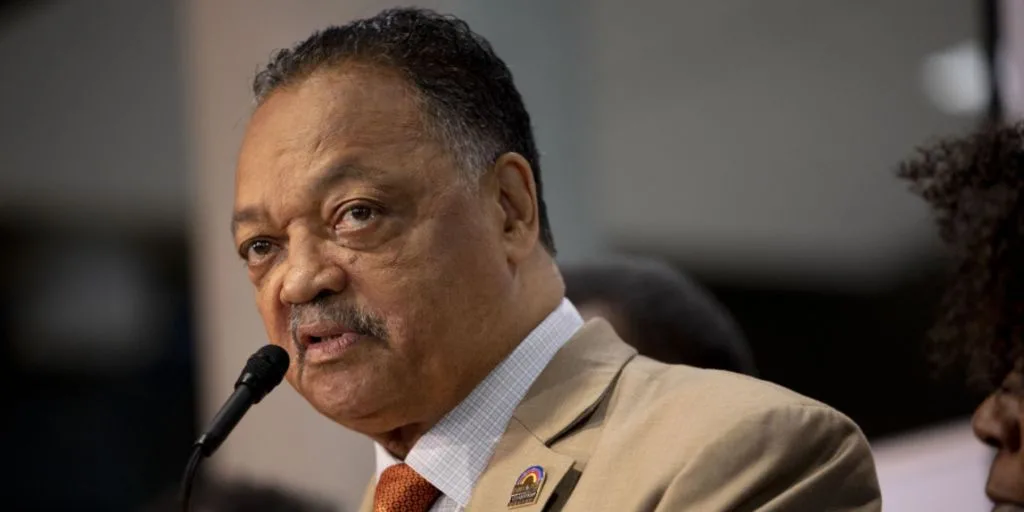Skip to main content
July 14, 2023 12:52 PM
In the annals of Chicago politics, The Rev. Jesse Jackson proved to be the ultimate “we don’t want nobody nobody sent.”
An outsider by birthplace, race and social outlook to the Democratic Party machine, Jackson as a young activist and then as founder of the Rainbow PUSH Coalition catalyzed the African American community’s move toward political independence, which gathered momentum in the 1970s and triumphed in 1983 with Harold Washington’s election as mayor.
“He is incredibly important in bringing all kinds of — for lack of a better term — civil rights measures to Chicago and helping elect more Black officials,” Don Rose, the political consultant who has known Jackson since the mid-1960s, said today. “He paved the way for Harold Washington’s victory. You could go on and on, but that sums it up.”
Diagnosed with Parkinson’s disease in 2017 and COVID in 2021, Jackson, 81, says he’s stepping down as president of the coalition, with a successor to be named soon.
In the 1980s, he was twice an unsuccessful candidate for the Democratic Party presidential nomination, considered the first viable presidential candidacy by an African American, and then saw two sons elected to Congress.
At Barack Obama’s presidential victory rally in Grant Park on election night in 2008, Jackson wept openly, a scene captured for a global audience that encapsulated the transformation of American politics since Jackson arrived here nearly 60 years ago, when the lone Black members on the City Council were known as the “Silent Six.”
Jackson’s political impact was an outgrowth of the economic boycotts he launched with Operation Breadbasket and then Operation PUSH — People United to Save (later Serve) Humanity — to press firms to hire and promote more African Americans and improve minority contracting, and for banks to do more lending in struggling communities. In the mid-1980s, Jackson put the heat on Channel 2 (WBBM-TV), now known as CBS2, which led the station to hire a Black general manager, a city first.
“Today’s young people may not know how famous and influential Jesse was at that point in history, but he had real power,” Georgetown University basketball coach John Thompson wrote in an autobiography published posthumously in 2021. Operation PUSH led a boycott of sports apparel and equipment maker Nike in 1990 when Thompson was on the board.
A native of South Carolina, Jackson came to Chicago to attend the Chicago Theological Seminary but in 1966 found himself leading the Chicago branch of Operation Breadbasket, the economic-development arm of Martin Luther King Jr.’s Southern Christian Leadership Conference. Early on, Jackson and King attended a meeting with Chicago’s Black business leadership in the office of George Johnson, who with his wife, Joan, had started Johnson Products, makers of Afro Sheen and other ethnic hair care offerings.
“From that day forward, my colleagues and I wrapped our arms around him and gave him the support he needed,” George Johnson told Crain’s in 1988.
Operation Breadbasket targeted Jewel food stores and other retail chains with atrophying locations and shoddy produce in majority-minority neighborhoods, organizing don’t-shop campaigns and extracting promises through economic “covenants” to hire more African Americans and stock products of minority businesses, such as those of Baldwin Ice Cream, Parker House Sausage and Johnson Products.
Jackson could be grandiose. Newspaper columnist Mike Royko dubbed him “Jetstream Jesse.” He sometimes rubbed King and his followers the wrong way and split with Operation Breadbasket in 1972 to found Operation PUSH. That year, he and Ald. Bill Singer, 43rd, headed a coalition that pulled off the once-unthinkable: unseating Mayor Richard J. Daley’s slate of delegates to the Democratic National Convention, presaging a tumultuous new era in Chicago and national politics.
“You didn’t run for national office in the United States in the ’70s, ’80s and ’90s without going to PUSH,” Singer said today. “Everybody made the pilgrimage. Jesse just commanded that amount of respect and power.”
In 1982, Jackson criticized ChicagoFest, a city-sponsored festival, for its lack of minority participation and convinced entertainers Stevie Wonder and Kool & The Gang to cancel their appearances. While the protest petered out, it is credited with energizing the Black community against Mayor Jane Byrne, paving the way for Washington’s election.
During the 1980s, Operation PUSH targeted multinational firms like Coca-Cola, Kentucky Fried Chicken owner Heublein, Burger King and Revlon. Critics pointed to subsequent business awarded to Jackson’s half-brother, Noah Robinson, by Coke and Heublein and what Johnson Products had to gain from a boycott of cosmetics maker Revlon.
The Nike boycott fizzled, and Operation PUSH struggled to remain solvent and relevant. In 1999, it merged with the National Rainbow Coalition, a Washington, D.C.-based social justice organization Jackson founded in 1986, forming Rainbow PUSH.
By then, he had turned his attention to Wall Street, putting pressure on financial firms to foster minority entrepreneurs by connecting them to mainstream financial partners and potential customers. It was called the Wall Street Project, with President Bill Clinton giving the keynote address in 1998.
Six months later, Jackson mounted a LaSalle Street version. In one of the ironies of history, the keynoter for that event was William Daley, then Clinton’s secretary of commerce — and the son of the mayor who was Jackson’s early nemesis.



